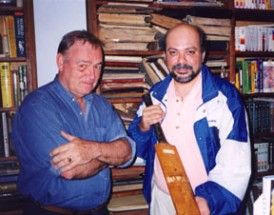DRS – A Chat with David Frith
Gulu Ezekiel |
The famous journalist who was the first to go into print with the idea of having line decisions scrutinized by TV replays has come out with his own solution to the vexed DRS system which is grabbing all the headlines on India’s ongoing tour of Australia.
David Frith, cricket historian, author of more than 30 books and founder-editor of Wisden Cricket Monthly magazine (now known as The Cricketer) feels it is time the power to call for replays should be taken out of the hands of the players.
It was after watching TV umpire Mel Johnson give Australian opener John Dyson not out after he was stranded a yard outside the crease in the fifth and final Ashes Test at Sydney in January 1983 that Frith made his clarion call.
That was in the first over of the Test and before Dyson had faced a ball. He would go on to bat for five hours for his 79 and shut England out of the Test in a series they lost 1-2.
I reflected that probably 20 million people in Australia and England saw the truth on their screens when the replays were shown over and over again, rubbing it in. Yet the restricted ability of one man – the chap in the white coat and hat at square leg – was the decisive factor. It was senseless Frith recalled in an exclusive e-mail interview from his home in Guildford, Surrey.
Frith admits he is a traditionalist at heart who ..hates change. But this development was one of the most necessary in the history of cricket. Still, his view was constantly being challenged and it would take a further nine years before the system was finally introduced by South African cricket chief Dr. Ali Bacher.
In fact 2012 marks the 20th anniversary of the first third-umpire decision when Sachin Tendulkar was given run out by Jonty Rhodes after square-leg umpire Cyril Mitchley consulted TV umpire Karl Leibenberg on the second day of the first Test at Kingsmead, Durban on November 14, 1992.
Ironically, given the current BCCI mindset, it was the late Madhav Rao Scindia who as president gave his consent for what was then seen as a radical development.
It is a damning indictment on those who have the responsibility of running the game that there is still a lack of clear thinking says Frith. The answer is simple. Just as you saw a couple of batsmen asked to remain on the field after straightforward dismissals [in the first Test at Melbourne], just to verify that it wasn’t a no-ball (and sometimes it was, and they’re reprieved), so in general practice you shouldn’t have players “referring”. For a start, the necessary limitation of referrals often means that they’re used up in genuine referrals which were not frivolous – opening the floodgates thereafter for bad decisions which cannot be challenged.
Frith strongly feels that the players must be left out of the process. The umpire (two of them if necessary) off the field should endorse every decision. This endorsement (or caution to have it rechecked) would be done subtly. The two-way communication between umpires off and on the field is the vital link. They will warn the on-field officials either not to let the dismissed batsman leave the field (in case the “out” decision was unsound) or else tell them to “freeze” play (after a not-out decision which is being verified) to prevent another ball from being bowled immediately.
Frith is convinced this system will work. It is the only way. Players will not be part of the process (apart from their initial appealing). Hold-ups will be of no greater length than at present.
Finally, he feels that once this “perfect” system is finally adopted, no one country can opt out. Why is India apparently so scared of the truth? If the current system is perceived as imperfect, it’s one helluva lot better than relying on human frailty. Wrong umpiring decisions must number into the thousands in the history of Test cricket. Until fairly recently there was no alternative. Today the answer is staring cricket in the face. The trouble is that some of the people charged with running the game are either unimaginative, too obsessed with making money or just plain stupid in their inability to see the obvious.






Could not agree more. Need a ‘trained video umpire’ who understands the limitations of video and the mathematics behind the tracking so that its applied sensibly and to ‘correct the obvious mistaken on field decision’.
Comment by Joe Drake-Brockman | 12:00am GMT 15 January 2012